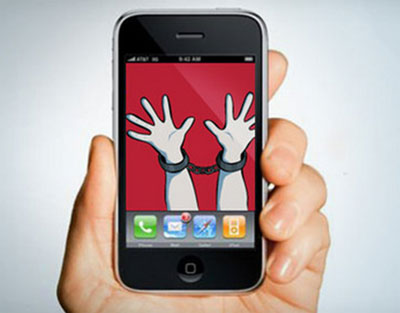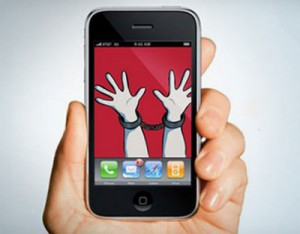

In the spirit of Halloween, I’d like to tell you a scary story. Imagine you’re walking down the street when you see a police officer having a hard time while confronting a disrespectful teenager. Suddenly, the officer throws the teenager to the ground, kicks him to make sure he stays down, and starts vigorously roughing him up as she handcuffs him. Shocked by the sudden violence, you grab your cell phone to record the incident. Perhaps you intend to file a complaint against the officer; perhaps you want to help the teenager if he decides to sue; perhaps you’re just interested. The officer notices you recording the incident, and walks over to you. She asks, gruffly, if your phone is recording audio, as well as video, and you answer “yes” without really thinking. The next thing you know, your phone has been confiscated and you find yourself cuffed and under arrest, being hauled off to jail along with the teenager.
Unlike danger in many scary stories, this danger is real, and in a few states (including
Illinois) your arrest would be perfectly legal. Broadly-written wiretapping laws, enacted to
protect peoples’ privacy, have been twisted and used in a draconian manner by police and prosecutors to silence private citizens who record police officers, in public places, while the officers are performing their official duties. Wiretapping statutes, written forty, thirty, or even just ten years agoin no way contemplated a world in which an overwhelming majority of Americans carry video and audio recording devices at all times. An
interesting article in the magazine
The News Media &The Law discusses the prevalence of cameras and camera phones and their impact on clashes between police officers and those who film them.
Use of wiretapping laws, by police officers and prosecutors, to arrest and prosecute otherwise innocent people filming the police in public is
unacceptable, in my view. The idea that a citizen can be arrested and charged with a felony for documenting the activities of public officers performing their duties, where the citizen is not interfering with those duties is both legally untenable and makes for disastrous public policy. Legally, there is a strong argument that a right to record the police is protected by the First Amendment. In a very recent case (August 2011),
Glik v Cunniffee, 655 F.3d 78 (1st Cir 2011), arising out of a situation similar to the “scary story” described above, the First Circuit Federal Court of Appeals agreed, stating that “the First Amendment protects the filming of government officials in public spaces”. This unfortunately contrasts with a case decided in January of 2011, ACLU v Alvarez (available on Lexis at
2011 U.S. Dist. LEXIS 2088, no public cite available) from the Federal District Court in the Northern District of Pennsylvania. The court in Alvarez held that protecting the recording of police officers would be “an unprecedented expansion of the First Amendment.”
Are there other bases on which to defend a “right to record public officials”? Does it matter if the recording stays private or is made public? Next month, I will return with a post devoted to the reasons why sound public policy demands that the courts protect this “right to record,” and discuss the possible consequences if courts uphold the alternative.

 In the spirit of Halloween, I’d like to tell you a scary story. Imagine you’re walking down the street when you see a police officer having a hard time while confronting a disrespectful teenager. Suddenly, the officer throws the teenager to the ground, kicks him to make sure he stays down, and starts vigorously roughing him up as she handcuffs him. Shocked by the sudden violence, you grab your cell phone to record the incident. Perhaps you intend to file a complaint against the officer; perhaps you want to help the teenager if he decides to sue; perhaps you’re just interested. The officer notices you recording the incident, and walks over to you. She asks, gruffly, if your phone is recording audio, as well as video, and you answer “yes” without really thinking. The next thing you know, your phone has been confiscated and you find yourself cuffed and under arrest, being hauled off to jail along with the teenager.
Unlike danger in many scary stories, this danger is real, and in a few states (including Illinois) your arrest would be perfectly legal. Broadly-written wiretapping laws, enacted to protect peoples’ privacy, have been twisted and used in a draconian manner by police and prosecutors to silence private citizens who record police officers, in public places, while the officers are performing their official duties. Wiretapping statutes, written forty, thirty, or even just ten years agoin no way contemplated a world in which an overwhelming majority of Americans carry video and audio recording devices at all times. An interesting article in the magazine The News Media &The Law discusses the prevalence of cameras and camera phones and their impact on clashes between police officers and those who film them.
Use of wiretapping laws, by police officers and prosecutors, to arrest and prosecute otherwise innocent people filming the police in public is unacceptable, in my view. The idea that a citizen can be arrested and charged with a felony for documenting the activities of public officers performing their duties, where the citizen is not interfering with those duties is both legally untenable and makes for disastrous public policy. Legally, there is a strong argument that a right to record the police is protected by the First Amendment. In a very recent case (August 2011), Glik v Cunniffee, 655 F.3d 78 (1st Cir 2011), arising out of a situation similar to the “scary story” described above, the First Circuit Federal Court of Appeals agreed, stating that “the First Amendment protects the filming of government officials in public spaces”. This unfortunately contrasts with a case decided in January of 2011, ACLU v Alvarez (available on Lexis at 2011 U.S. Dist. LEXIS 2088, no public cite available) from the Federal District Court in the Northern District of Pennsylvania. The court in Alvarez held that protecting the recording of police officers would be “an unprecedented expansion of the First Amendment.”
Are there other bases on which to defend a “right to record public officials”? Does it matter if the recording stays private or is made public? Next month, I will return with a post devoted to the reasons why sound public policy demands that the courts protect this “right to record,” and discuss the possible consequences if courts uphold the alternative.
In the spirit of Halloween, I’d like to tell you a scary story. Imagine you’re walking down the street when you see a police officer having a hard time while confronting a disrespectful teenager. Suddenly, the officer throws the teenager to the ground, kicks him to make sure he stays down, and starts vigorously roughing him up as she handcuffs him. Shocked by the sudden violence, you grab your cell phone to record the incident. Perhaps you intend to file a complaint against the officer; perhaps you want to help the teenager if he decides to sue; perhaps you’re just interested. The officer notices you recording the incident, and walks over to you. She asks, gruffly, if your phone is recording audio, as well as video, and you answer “yes” without really thinking. The next thing you know, your phone has been confiscated and you find yourself cuffed and under arrest, being hauled off to jail along with the teenager.
Unlike danger in many scary stories, this danger is real, and in a few states (including Illinois) your arrest would be perfectly legal. Broadly-written wiretapping laws, enacted to protect peoples’ privacy, have been twisted and used in a draconian manner by police and prosecutors to silence private citizens who record police officers, in public places, while the officers are performing their official duties. Wiretapping statutes, written forty, thirty, or even just ten years agoin no way contemplated a world in which an overwhelming majority of Americans carry video and audio recording devices at all times. An interesting article in the magazine The News Media &The Law discusses the prevalence of cameras and camera phones and their impact on clashes between police officers and those who film them.
Use of wiretapping laws, by police officers and prosecutors, to arrest and prosecute otherwise innocent people filming the police in public is unacceptable, in my view. The idea that a citizen can be arrested and charged with a felony for documenting the activities of public officers performing their duties, where the citizen is not interfering with those duties is both legally untenable and makes for disastrous public policy. Legally, there is a strong argument that a right to record the police is protected by the First Amendment. In a very recent case (August 2011), Glik v Cunniffee, 655 F.3d 78 (1st Cir 2011), arising out of a situation similar to the “scary story” described above, the First Circuit Federal Court of Appeals agreed, stating that “the First Amendment protects the filming of government officials in public spaces”. This unfortunately contrasts with a case decided in January of 2011, ACLU v Alvarez (available on Lexis at 2011 U.S. Dist. LEXIS 2088, no public cite available) from the Federal District Court in the Northern District of Pennsylvania. The court in Alvarez held that protecting the recording of police officers would be “an unprecedented expansion of the First Amendment.”
Are there other bases on which to defend a “right to record public officials”? Does it matter if the recording stays private or is made public? Next month, I will return with a post devoted to the reasons why sound public policy demands that the courts protect this “right to record,” and discuss the possible consequences if courts uphold the alternative.

